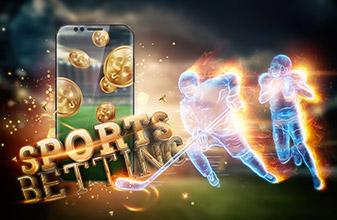Parlays off the Board

Sharp Sports Betting is a tool for those interested in winning money at sports betting. The book explains the most common sports bets, what all the numbers mean, and the mathematics behind the numbers.
Prospective sports bettors should know the basic principles of the discipline in which they are involved.
All other types of casino advantage players, including blackjack players of all skill sets, which includes card counters, should have good working knowledge of Expected Value as well. You should not be betting online or anywhere else without this fundamental knowledge.
A parlay is a bet involving more than one team. When discussing parlays, team can mean side or it can be an over or an under.
The two major kinds of parlays are “off the board” and “parlay cards.”
Off the board, when referring to parlays, means the customer selects the teams to parlay from among the various possible bets that could be made alone as straight bets. Parlay cards are printed up by the book, and have numbers on them that may or may not be the same as listed on the board.
Parlays Off The Board
Look around a sportsbook for its list of rules, and among them you will find payoffs on parlays.
These payoffs apply to combinations of any sports bets available in the sportsbook, except for those bets on which the book specifies “no parlays.”
The vig on a two- or three-team parlay is related to the vig on a straight bet. A person whose picks are no better than guessing loses faster at parlays than at straight bets. A person whose handicapping skills are sufficient to get an edge at straight bets can get a bigger edge on two- or three-team parlays, but with more risk. Parlaying four or more teams almost always is a bad bet.
Probably parlays got their start when some bettor said to his bookie: “I want to bet team A to beat team B, and then I want to use the payoff to bet team C to beat team D, but I don’t want to have to find you to collect on the first game in order to bet on the second game. Can you just use my first-game payoff as a bet on the second game?”
The bookie of course said “Can do,” and then sat down to work out the math. He collects $11 from his customer as a bet on team A, and if team A wins, the payoff to the customer will be $21. But instead of handing that $21 to the customer, he uses that $21 as a bet on team C. If team C wins, each $11 of the new bet will turn into $21, so a $21 bet will turn into $40.09.
So if both team A and team C win, the bettor wins $29.09 from the bookie. If A or C loses, or if both of them lose, the bookie wins $11 from the bettor.
That would get the bookie to thinking: Why not offer this two-game parlay to other customers? And why require that one game be finished before the other begins — the bet could be made on two games played simultaneously.
-------------------------------------------------
This is part of an occasional series of articles.
Excerpted with permission from Sharp Sports Betting by Stanford Wong, edited for this format.











Please log in or register to leave a comment